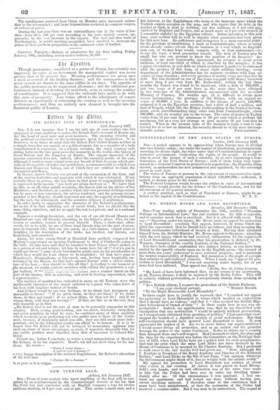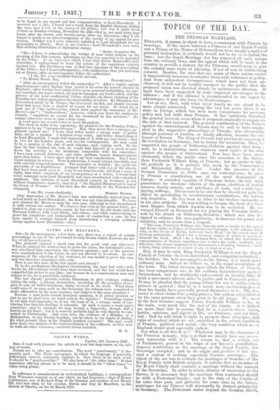CONFEDERATION OF THE FREE STATES OF EUROPE.
London, 13th January 1857.
San—A period appears to be approaching when Europe may be divided into two hostile camps ; one under the banner of Absolutism, presumptuously asserting its divine right, the other under that of Constitutionalism or representative government, vindicating the rights of the people. It would be wise to avert the danger of such a calamity, by at once organizing a Confederation of the Free States of Europe ; each of them being duly represented in a General Congress in proportion to population ; the Deputies being elected, as ambassadors are now nominated and appointed, by the sovereign power in each state. The states of Europe at present in the enjoyment of representative institutions form an aggregate population of about 130,000,000,—sufficient, if united, to dictate peace to the world. The Federal Congress would become the arbiter in cases of international difference—would provide for the defence of the Confederation, and for the advancement of its general interests. A central position, such as that of Neuchatel or Geneva, might be se lected as the capital of the Confederation. W. B. C.
MR. MORRIS MOORE AND LORD BLOOMFIELD. Dresden, 23d December 1856. Sin—Your leading article of December the 13th, entitled "Prussian Outrage on International Law," has just reached me. Its title is apposite, and it contains much that is excellent. But it is alloyed with error. You say—" Smarting under his injury, Mr. Moore made an appeal for protection to Lord Bloomfield ; couching that appeal, however, in terms which implied the expectation that he should have no redressoind thus accusing the British Ambassador beforehand of breach of duty. Having thus alienated himself from the British Minister, Mr. Moore appeals to the press ; mingling with the real injury which he had received, indignation for the supineness of Lord Bloomfield,and assumption that his persecution is dictated by Dr. Waagen, champion of the courtly Eastlake at the National Gallery."
You have here either confounded two distinct letters, or you have been misled by the ignoble attacks upon me in the English press,—the reward of more than ten years' endeavour to save national property, and to maintainthe mental respectability of England. But meanness is the staple of a people that submits to anti-national councils. When I made my "appeal for protection to Lord Bloomfield," I was not smarting under injury, for as yet none had been inflicted. That appeal ran thus. "Berlin. Nov. 21, Friday Evening. "My Lord—I have been informed that, on my return to my apartments, at 33, Tauben Strasse, I shall be molested by the Berlin Police. This will be entirely without provecation,.as I scrupulously abstain from speaking of politics. "As a British citizen, I request the protection of the British Embassy.
"I am your obedient servant, " MORRIS MOORE. "To the Right Honomnble Lord Bloomfield."
Is there aught here to justify the reproach that "I couched my appeal for protection to Lord Bloomfield in terms which implied an expectation that I should have no redress," and that I "thus accused the British Minister beforehand of breach of duty " ? Is there aught here in any way objectionable? Indeed, my apprehension was, that in my forestalled selfexculpation that any molestation "would be entirely without provocation,. as I scrupulously abstained from speaking of polities," I had somewhat overstepped the bounds of a dignified anxiety to avoid molestation. But that self-exculpation should have spurred Lord Bloomfield to duty. It now aggravates his neglect of it. Are we to crawl before our representatives? I would sooner forego all protection, and as an outlaw run the gauntlet through the police of the entire Continent. Better to abjure one country than dereeate from one's self-respect. Had I stomach to crawl the plane and the time for the experiment was before the Committee on the National Gallery of 1853, when Lord Elcho held out a golden bait for such compliance— that bait the prize which the same Lord Dello has since declared in. the Rouse of Commons to be usurped by Sir Charles Eastlake. But I preferred to walk erect to the full stature God had given me. "Now, although Sir C. Eastlake is President of the Royal Academy and Director of the National Gallery," said Lord Elcho on the 6th of last June, "his opinion, whatever the Grkernment might think of it, has no weight with the artistic world." My appeal for protection to Lord Bloomfield was written at about nine o'clock in the evening. At eleven it was placed in Lord Bloomfield's own bands, and an oral affirmation was at the same time made to him that the Police had been seen to enter my dwelling immediately after me. Of this circumstance I was ignorant. I had entered my apartment, and had locked my door, without having perceived anything unusual. I therefore came to the conclusion that I must have been misinformed, or that the emissaries of the Police had received a counter-order. But I was soon to be undeceived. The sequel is
to be found in my second and last communication to Lord Bloomfield. I received not a line, I heard not a word, from the English Embassy during the time that I was at the mercy of the Police; nor was it until seven o'clock on Sunday evening, November the 23d—that is, not until forty-four hours after my arrest, and twenty-seven after my liberation—that I obtained so much as an acknowledgment of the receipt of my appeal for protection. Neither was I even remotely indebted to Lord Bloomfield for my restoration to liberty. Here is my voucher—Lord Bloomfield's own note, that striking illustration of diplomatic energy. "Berlin, November 23d.
" have to acknowledge the receipt of your letter written on the evening of the 21st instant, informing me that you expected to be molested by the Police. At an interview which I had with Baron Manteuffel early yesterday, I endeavoured to learn the nature of the suspicions existing against you. His Excellency was at that time ignorant of the proceedings of the Police; but I heard subsequently., with satisfaction, that you had been set at liberty, after an interrogatory before the authorities.
"I am, Sir, your obedient humble servant, "To Morris Moore, Esq. BLOOMFIELD."
"After an interrogatory before the authorities " ! After a night's unjust imprisonment—after having been jeered at for even the tamest allusion to England—after having been subjected to gross personal indignities, my person searched, my purse seized, my papers damaged, my books soiled, and the privacy of my most confidential letters violated—in direct violation of the Prussian law, which guarantees the inviolability of letters. My liberation was determined solely by AL Norner, the Procureur du Roi, and simply because there had never been a shadow of reason for my arrest. So much for at least one of "the indiscretions which have marred the statement of Mr. Moore's case" ; " indiscretions," however, which you have the candour to remark, "constitute no excuse for the treatment he has received." To assume otherwise were to raise a false issue.
A word upon my second letter to Lord Bloomfield.
The stock in trade of my opponents, the pleaders for the Prussian Police, appears to be my "intemperateness." May they never have a stronger argument against me ! I wrote that letter under a strong sense of public duty, not in a passion. I weighed every word ; and before despatching it to Lord Bloomfield, I made four transcripts of it with my own hand,—that is, two for the London press, and two for contingencies. No man could be in a passion at the end of such irksome, such taming work. By the time he had finished his task, ho would find himself in a mood to pare down his severity to the minimum compatible with his conscience. I have seen several dishonest, and some, perhaps, honest animadversions upon that letter. I have since given it my best consideration. But I have found nothing to retract. Were it otherwise, I would retract cheerfully and with suitable acknowledgments. The narrative is faithful ; the spirit not unworthy of an Englishman. Compare that letter with any of the attacks that have been made upon it. I say it not from bravado, but from a sense of right, that while conscious of my incompetency as a writer, I would that every comment upon Lord Bloomfield had been accentuated with redoubled emphasis. The estimate of Lord Bloomfield current in Germany is not without foundation—namely, that he is "the English Minister not to but of the Court of Prussia." At his door lies the audacity of the Prussian Government.
I am, Sir, yours obediently, Mounts Moons. [Our impression of Mr. Moore's tone was undoubtedly derived from his
second letter to Lord Bloomfield; the first was not objectionable. We have now allowed Mr. Moore to state his own ease, although he has encumbered it with extraneous matter. We observe that even in the present letter, intended to clear up a particular point, he has revived his old feuds with tho National Gallery, with Lord Elcho, and others ; and while endeavouring to prove his temperate and businesslike mode of conducting a case, he has been unable to restrain himself from introducing a sweeping political charge against Lord Bloomfield.—En.]



























 Previous page
Previous page